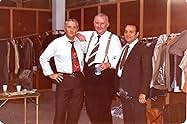Ajouter une intrigue dans votre langueThe drama surrounding the dismissal of Mr. Gough Whitlam as the Labor Prime Minister of Australia, 1975 - by the then Governor General of Australia, Sir John Kerr, and the subsequent install... Tout lireThe drama surrounding the dismissal of Mr. Gough Whitlam as the Labor Prime Minister of Australia, 1975 - by the then Governor General of Australia, Sir John Kerr, and the subsequent installation, in Parliament.The drama surrounding the dismissal of Mr. Gough Whitlam as the Labor Prime Minister of Australia, 1975 - by the then Governor General of Australia, Sir John Kerr, and the subsequent installation, in Parliament.
- Récompenses
- 3 victoires au total
Avis à la une
The first reason to see it is the stunning portrayal of Gough Whitlam by the late Max Phipps - one of Australia's greatest actors.
After a series of scandals that engulfed the Australian Labor Party government of the early 1970's, the House of Representatives representing the people numerically and the Senate representing the people of each state went to political war over the budget! With each house controlled by opposing parties and the government running out of money, the Senate demanded that Prime Minister Whitlam call a general election to solve the deadlock. Whitlam refused stating the long accepted convention that as long as his government had the confidence of the Lower House of Parliament, he could stay in office. It was at this point that the long thought irrelevant institution of the Crown, represented by Governor General John Kerr got involved to remind the politicians, and the people that elected them, where power truly resides in the Westminster System.
How this crisis was resolved should not only be of interest to Australians but also to the citizens of other Commonwealth countries, especially Canada and the UK, with their bicameral (yet unelected) Upper Houses. Even Americans, with their elected bicameral Congress, will find some parallels!
This really is a story that should be more well known to those interested in political science and history around the world! Highly recommended!
I was greatly impressed by how interesting the account was. As dramatic as events were, this could have been a very boring political drama. However, it was a pretty suspenseful mini-series. I was also impressed by how understandable it was, despite my lack of familiarity with Australian politics. It didn't take long to figure out who everyone was, and what their roles were.
Having said that, it is not an entirely impartial account. Malcolm Fraser is certainly portrayed as a rather Machiavellian figure, who lets no person or thing get in the way of his quest to be Prime Minister. Gough Whitlam is portrayed in a more noble, almost saintly, light. However, the actor portraying Whitlam channels the nobility in such a way that it comes across more as pomposity. I thought that Sir John Kerr was portrayed in a fairly sympathetic manner.
I must warn people that the DVD is of very poor quality. I understand that it was made for television in the early 80s, but it would appear that no effort was made to restore the picture quality or sound quality. It was very disappointing that no extras were added either. A documentary, or even some interviews with the historical figures, would have enhanced the experience, but there is nothing.
I highly recommend this mini-series for anyone interested in the real-life events.
Le saviez-vous
- AnecdotesOne of three major film and television collaborations of actress Robyn Nevin and director Carl Schultz. The productions are the feature films 'Goodbye Paradise'' (1983) and 'Careful, He Might Hear You' (1983) and two episodes of the television mini-series 'The Dismissal' (1983).
- Citations
Gough Whitlam: [referring to Opposition Leader Billy Snedden] Before the Leader of the Opposition can talk about leadership, let him serve his apprenticeship. Let him do some on-the-job training. Better still, let him do some adult re-training.
- ConnexionsFeatured in Four Corners: Lest We Forget (1985)
























